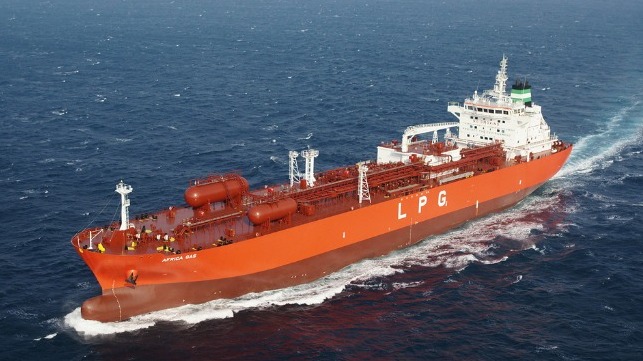ABS Working with Korean Shipbuilders on CO2 Carrier Design

Achieving the ambitious goals addressing the climate contained in the Paris Agreement and other efforts requires developing strategies to address carbon emissions. Technology for the collection and storage of carbon emissions is a cornerstone of carbon negative strategies.
Korean shipbuilders Hyundai Mipo Dockyard and Korea Shipbuilding & Marine Engineering Co. are launching a new initiative working with ABS and the Republic of the Marshall Islands Maritime Administrator to develop designs for a liquefied CO2 carrier. The vessel would play a critical role in the widely discussed carbon capture and storage strategies being promoted as part of the global decarbonization initiatives.
“Carbon capture and storage (CCS) has the potential to make a significant contribution to global emissions reduction strategies and safe and efficient transport of liquefied carbon is going to be key to realizing these goals,” said Patrick Janssens, ABS Vice President, Global Gas. “Development of these next generation CO2 carrier designs will speed the adoption of CCS technology and facilitate net negative emissions strategies. As a global leader in the classification of gas carriers, ABS is delighted to be able to use our experience to support this project.”
Through this agreement, the Korean shipbuilders plan to develop a ship that can stably maintain and transport liquefied carbon dioxide at low temperature and high pressure. This ship will liquefy carbon dioxide generated during industrial activities, such as power plants or steel mills, and transport the gas to storage facilities.
Hyundai Mipo will develop the designs for the ship and its cargo storage system. The design will be optimized for liquefied carbon dioxide transportation and based on the yard’s experience of building other forms of gas carriers. The carrier design will utilize adapted versions of HMD’s TYPE-C tank design to transport CO2 that has been reduced in volume by about 600 times under liquefaction.
Korea Offshore & Shipbuilding will develop a cargo handling system using new technology applied to maintain a stable state without emitting carbon dioxide into the atmosphere during operation.
“It is time for the marine industry to develop new transport solutions to contribute to global carbon neutrality,” said Byeong-Yong Yoo, KSOE Vice President. “CO2 carriers will play an important role in the overall value chain of CCS and reduce global CO2 emissions. As a world-leading shipbuilding and marine engineering company, KSOE is pleased to be able to leverage our expertise in LNG carrier and LPG carriers to pioneer development of a high-performance CO2 handling system.”
HMD notes that it is also working on the development of ammonia-fueled ships and a liquefied hydrogen carrier, and believes that all of these projects can help the yard to rise its competitive position while contributing to the global climate efforts.

that matters most
Get the latest maritime news delivered to your inbox daily.
“The world is transitioning to a low-carbon future and the RMI is pleased that our gas team has been selected to contribute in this effort to develop designs for the safe transportation of liquified CO2,” said Tom Blenk, Deputy Commissioner of Maritime Affairs of the RMI.
ABS and RMI will evaluate designs for approval and verification. The Korean shipyards expect to submit their designs for review to obtain a basic design certification (Approval in Principle) from the classification society by the second half of this year.
